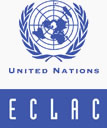Experts meeting under UN Economic Commission for Latin America and the Caribbean (ECLAC) auspices discussed current and emerging issues in the water and sanitation sector in Latin America and the Caribbean (LAC), what changes might be needed in the current public model for the sector, and implications for achieving the Millennium Development Goals (MDGs) and realizing the goal of universal access.
Also discussed were emerging issues such as climate change adaptation, energy and water efficiency, making the sector environmentally sustainable, and promoting competition.
 23 July 2013: Experts meeting under UN Economic Commission for Latin America and the Caribbean (ECLAC) auspices recently discussed current and emerging issues in the water and sanitation sector in Latin America and the Caribbean (LAC), what changes might be needed in the current public model for the sector, and implications for achieving the Millennium Development Goals (MDGs) and realizing the goal of universal access.
23 July 2013: Experts meeting under UN Economic Commission for Latin America and the Caribbean (ECLAC) auspices recently discussed current and emerging issues in the water and sanitation sector in Latin America and the Caribbean (LAC), what changes might be needed in the current public model for the sector, and implications for achieving the Millennium Development Goals (MDGs) and realizing the goal of universal access.
The Meeting of Experts on Tariff and Regulatory Policy in the Context of the MDGs and the Human Right to Water and Sanitation convened on 8 July 2013, in Santiago, Chile, at ECLAC headquarters.
The Meeting opened with a presentation on the outlook for LAC to achieve the MDGs on water and sanitation. On drinking water, ECLAC projected that while the regional average has exceeded the MDG, 23% of LAC countries may not meet their MDG at the country level. On sanitation, the MDG might be met on a regional level by 2015, but 54% LAC countries probably will not achieve the target on a national level. Haiti, Jamaica, Nicaragua and Saint Lucia were projected as likely to miss the MDGs in both areas.
In the morning, the Meeting featured panel discussions on: the challenges facing regulation and control under the public service model (water and sanitation provided by state-owned utilities or directly by municipalities); regional trends and state-of-the-art in service tariff setting, self-financing and subsidies; and the implications for present models of the recognition of the human right to water and sanitation (i.e., universal access). These discussions were based on the conclusions of three studies released by ECLAC during 2013: ‘Tariff Policies to Achieve the MDGs: Current Situation and Recent Regional Tendencies;’ ‘The Human Right to Water and Sanitation in Light of the MDGs;’ ‘Best Practices in Regulating State-Owned and Municipal Water Utilities.’
The afternoon sessions focused on presentations of national experiences from Argentina, Brazil, Chile, Costa Rica, Guatemala, Honduras, Mexico, Nicaragua and Paraguay. The Meeting concluded with a short presentation and discussion of emerging issues, including: implications of climate change adaptation for sector investment and governance; reducing the carbon footprint of the sector, increasing water and energy efficiency, and promoting reuse and recycling; environmentally sustainable services, through payment for environmental services, basin management, ‘green infrastructure,’ and use of treated wastewater; and promoting competition in the sector, particularly in supply sources. [Meeting of Experts Agenda and Presentations (in Spanish)]